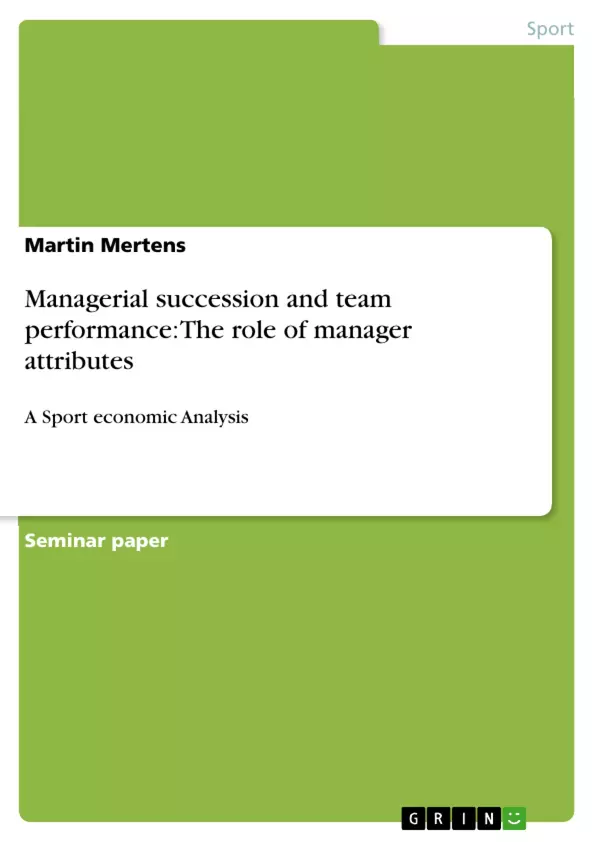Michael Owen’s statement above shows the point of view of a player after manageri-al succession. With a new manager coming, the atmosphere in a team is tense. The player’s skills are reassessed and their position in the team is insecure. It becomes necessary to demonstrate some strength and impress the new manager. A strained situation for everyone involved, not just the players. Owen’s remark then naturally does not take into account the manager’s point of view and how he might perceive a team and react to the disruptive effects of succession. In sports, managers perform several functions which are often deemed critical to the performance of organizations. Therefore, when teams perform poorly, there is a common notion that managerial succession and replacing the manager will lead to improved performance. In spite of numerous studies and ongoing attention to this interesting phenomenon, the effect of managerial successions on team performances remains a debated issue. Related to this issue is the investigation of the impact of a manager’s attributes, such as ability or experience. Do managerial skills affect team performance, and if so, how can these attributes be assessed? The results of such studies might solidify an evaluation of a manager’s work when carefully distinguishing between the manager’s contribution to team success or failure and the team’s own performance. As such, investigations like those studied in this paper might help to break the today often criticized habit of hiring and firing a manager solely based on won-loss balances. Obviously, there is still a need to investigate this phenomenon in greater detail in a theoretical and empirical way.
Inhaltsverzeichnis (Table of Contents)
- Introduction
- State of Research
- Theoretical background
- Common Sense and Vicious Circle
- Ritual Scapegoating
- Econometric analysis based on J.L. Fizel & P. D’Itri
- Analytical procedures and data
- Analysis and Interpretation
- Results
- Additional econometric studies
- Analysis of J. Pfeffer and A. Davis-Blake
- Analysis of D. Jacobs and L. Singell
- Conclusion
Zielsetzung und Themenschwerpunkte (Objectives and Key Themes)
This paper investigates the complex relationship between managerial succession, team performance, and the role of manager attributes in professional sports, specifically focusing on team sports. The paper aims to provide a comprehensive overview of existing research on this topic and to examine the validity of established theories such as the common sense, vicious circle, and ritual scapegoating theories.
- The impact of managerial succession on team performance.
- The different theoretical perspectives on managerial turnover.
- The significance of manager attributes, such as ability and experience, on team success.
- The use of econometric analysis to measure managerial efficiency and its relationship to succession.
- The need for further research to understand the complex dynamics of managerial succession and its implications for team performance.
Zusammenfassung der Kapitel (Chapter Summaries)
The introduction outlines the central research question of the paper, which is the impact of managerial succession on team performance and the role of manager attributes. The second chapter reviews existing research on this topic, highlighting the three main theories: the common sense, vicious circle, and ritual scapegoating theories.
Chapter three delves deeper into the theoretical background, providing detailed explanations of the three theories. It examines Grusky's work on the common sense and vicious circle theories and Gamson and Scotch's study on the ritual scapegoating theory.
Chapter four introduces the econometric analysis of Fizel and D’Itri, focusing on their use of data envelopment analysis (DEA) to measure managerial efficiency. This chapter describes the data sources, analytical procedures, and key results of their study.
Chapter five explores two additional econometric studies: the work of Pfeffer and Davis-Blake and Jacobs and Singell. Pfeffer and Davis-Blake investigate the effects of succession and the role of manager ability in mediating the succession effect. Jacobs and Singell focus on isolating the impact of managers on team performance by separating the contributions of employees from those of managers.
Schlüsselwörter (Keywords)
The core keywords and focus topics of the text include managerial succession, team performance, manager attributes, efficiency, econometric analysis, data envelopment analysis (DEA), common sense theory, vicious circle theory, ritual scapegoating theory, sports management, and organizational performance.
Frequently Asked Questions
How does managerial succession affect team performance?
The impact is a debated issue. While common sense suggests replacing a manager improves performance, theories like the "vicious circle" or "ritual scapegoating" offer different perspectives.
What is the "ritual scapegoating" theory?
This theory suggests that managers are often fired not because they are solely responsible for failure, but as a ritualistic act to appease stakeholders and signal change.
Which manager attributes are most important for success?
The research examines attributes like innate ability and professional experience to see how they influence team outcomes and managerial efficiency.
What is Data Envelopment Analysis (DEA) in sports management?
DEA is an econometric tool used to measure the efficiency of managers by comparing inputs (player quality, resources) with outputs (wins, performance).
Does hiring and firing based on won-loss records make sense?
The paper criticizes this habit, suggesting that a deeper analysis of the manager's actual contribution versus the team's inherent performance is necessary for a fair evaluation.
- Quote paper
- Martin Mertens (Author), 2011, Managerial succession and team performance: The role of manager attributes, Munich, GRIN Verlag, https://www.hausarbeiten.de/document/199371


